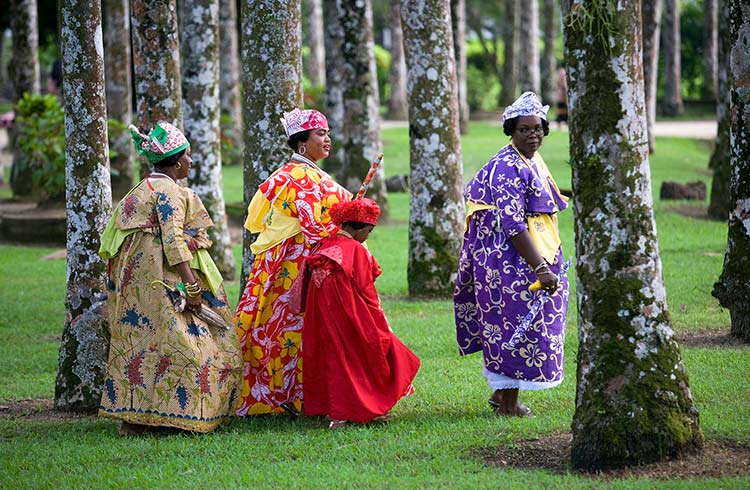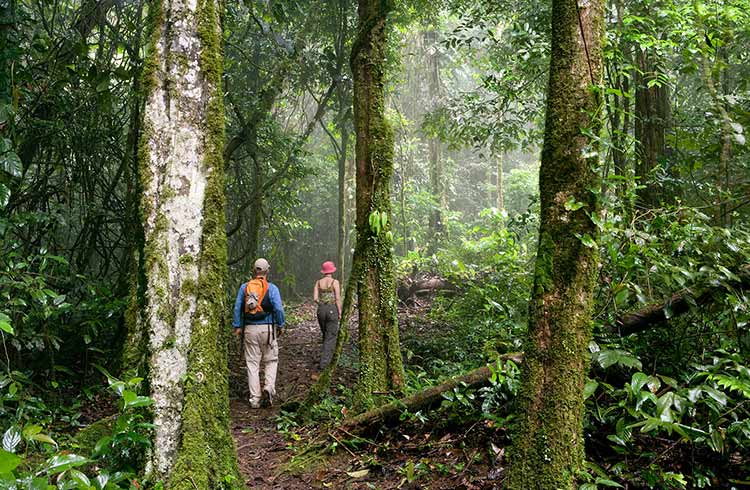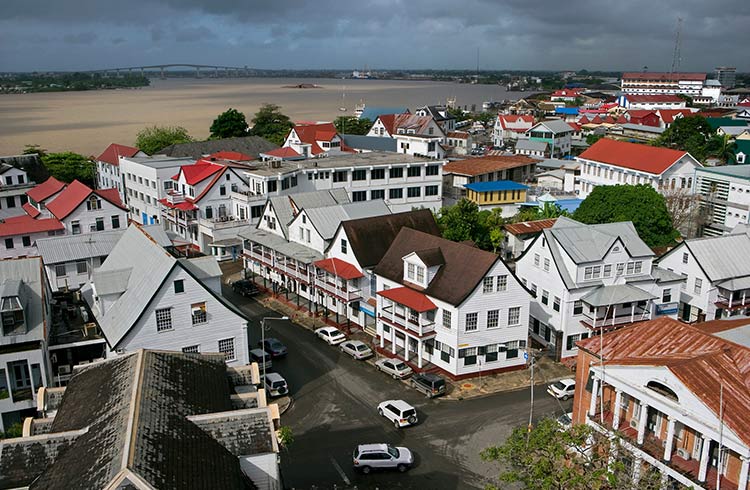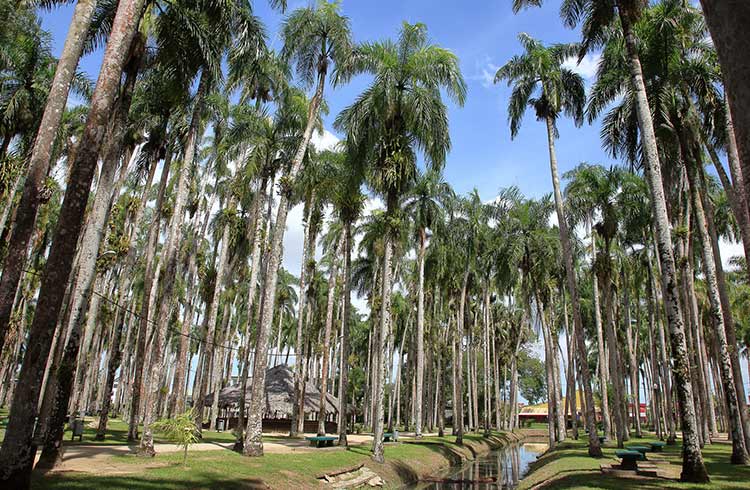Is Suriname Safe? 5 Essential Travel Tips for Visitors
After a challenging trip to Suriname, Diane Selkirk shares her top tips to help you stay safe in this off-the-beaten-track destination. From medical facilities to petty crime, here’s what you need to know before you go.
 Photo © Getty Images/Frans Lemmens
Photo © Getty Images/Frans Lemmens
Suriname is sandwiched between Guyana and French Guiana on the northeastern coast of South America. Often left off travel itineraries to South America, this country has a lot going for it; with culturally diverse urban communities, a dense jungle that’s reached by river, and an intriguing food and arts scene that blends cultures from the Caribbean, Indonesia, India and China. I couldn’t wait to try pom, a national dish that has its roots in Jewish culture but that’s made with a local root called pomtajer.
Meanwhile, the country’s jungle (locally referred to as the interior) is home to a variety of traditional indigenous villages.
On our visit to Suriname we were excited about exploring the country, but instead my husband had a health crisis and I got a crash course in everything from finding a hospital in Paramaribo (the capital city), to currency management during an inflation crisis, and discovering which areas of town to avoid after dark. The Surinamese people I met along the way were happy to help me navigate the challenges, my husband recovered fully, and we still had a great visit.
While I learned that Suriname is a friendly country, it’s not an effortless place to travel; the roads are challenging, healthcare options are limited and the political situation is tumultuous. So, whether you’re there for the food and culture, the wildlife or the interior, here are some tips to keep you safe.
- Road safety and public transport
- Illness and mosquitoes
- Petty crime
- Banking and cash
- Political demonstrations
- Listen to The World Nomads Podcast: Suriname
1. Road safety and public transport
Getting around Suriname is a daytime endeavor. Roads are poorly-maintained and one of the first Dutch words we learned was drempel, which means speed bump. The bumps are huge, car-damaging mounds (unless the car swerves) and buses often hit at them at high speed. After dark, the narrow roads aren’t lit and people often park their cars in unexpected places (including on sidewalks). The risk of theft at bus stops and carjackings also increases after dark.
The country’s main modes of transport include bike, boat, motorcycle, car, taxi and bus. For travelers, bikes and motorcycles are especially challenging: road conditions are poor and crowded, and drivers tend to be aggressive. Private or government run buses are the cheapest and most popular mode of transport – but they aren’t always married to a schedule, and may not be maintained to the standards you’re used to back home.
Taxis cost more, and are faster, but aren’t metered so be aware that even if you negotiate a price you might be asked for USD or Euro tips (often referred to as gifts) and then get stranded if you don’t comply. To get around this you can ride collective taxis which hold more passengers. Surinamese people tend to watch out for travelers, and are quick to jump to your defense if someone tries cheating you.
To reach the interior you’ll likely travel by boat. Like buses and taxis, these come in various states of repair and may or may not have safety equipment onboard, so choose carefully.
Keep in mind that independent travel is still rare in Suriname, and, because of the challenging geographic terrain, many places are only accessible as part of an organized group. Even if reservations are made weeks in advance, boats only leave when full and are often not confirmed until the very last minute.
2. Illness and mosquitoes
Our arrival at an overcrowded emergency room was my first introduction to the medical system in Suriname. The care was adequate and treatment needed to be paid for in US dollars in advance.
Take the usual precautions including wearing long sleeves, insect repellent, and using antimalarials for Malaria, Chikungunya, Dengue, and Zika – especially if you travel outside of the urban areas.
If you’re headed to the interior make sure you’re prepared and have packed the right gear for heat, humidity and rugged isolation. It’s best to travel with a seasoned guide who is aware of where the drug runners operate, and who can communicate if a rescue is needed.

3. Petty crime
Statistically Suriname is safe, and like many countries the biggest risk is opportunistic petty theft. Locals often warned us about pickpockets and people forcing services on us for ‘tips’.
During the daytime we felt comfortable in the streets, but we kept everything secure and made a point of not wandering around aimlessly without a destination in mind.
One evening we lingered until dusk in the popular Waterkant area of Paramaribo, and discovered the atmosphere changed after dark when we encountered aggressive pan handlers (beggars). We were able to get help from a passing Surinamese couple, but another option would have been to flag down a taxi and get to a new location safely.
The truth is, in Suriname you’ll probably be given more cautions and warnings than the situation warrants. Initially we were alarmed by how often we were advised to be careful, but soon realized this meant there were more people watching out for visitors than there are people looking to take advantage of them.
4. Banking and cash
Like other South American countries, Suriname is experiencing high inflation. Very few places take credit or bank cards (including the hospital) and many places request Euros or US cash.
Avoid taking money out of street ATMS (using EFTPOS), criminals are known to hang out near the machines looking for targets. Instead visit banks during business hours and go inside to make a transaction. While both DSB Bank and the Republic Bank work well for most bank cards, you may find you need to visit a few banks before your bank cards work – and the bank that works one day may not work the next.
Keep in mind it’s illegal to exchange money on the street. Use only hotels, local banks or official money exchanges (cambios).

5. Political demonstrations
Cultural celebrations and political protests can look uncannily similar in Suriname. If you see a loud and colorful gathering, ask someone nearby to ensure what’s going on before you approach. Demonstrations are common, and are expected to increase as the economic crisis continues, and as the 2020 elections approach.
Listen to The World Nomads Podcast: Suriname
Related articles
Simple and flexible travel insurance
You can buy at home or while traveling, and claim online from anywhere in the world. With 150+ adventure activities covered and 24/7 emergency assistance.
Get a quote
3 Comments
The comment on metered taxis is not true, there are metered taxis in the city center.
1. Tourtonne Taxi (25 year old taxi company with a metered rate).
2. Stc Taxi 1660 ( 7 year old taxi company with metered rate & app).
These are the most popular ones.
Alot had to improve in Suriname, but it's a great country to explore.
cool! can you make a article about the taboos and do's? thanks!
I live in Suriname and I think the petty theft needs updated, Suriname is no longer a safe country,there are robbery and killing and rape every week sometimes every day
Suriname is very very very corrupt and out of control now